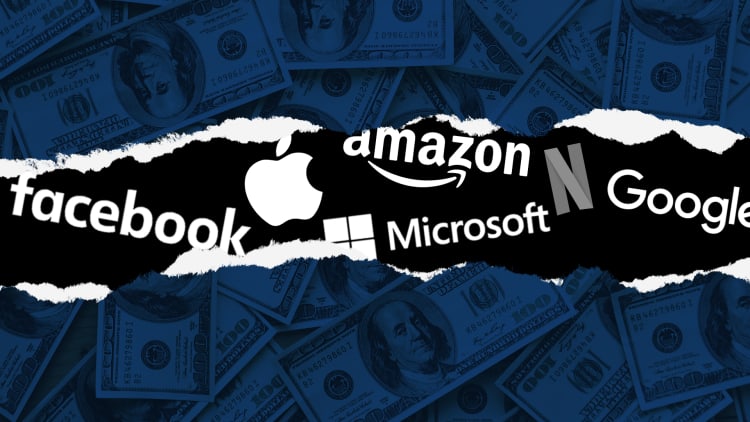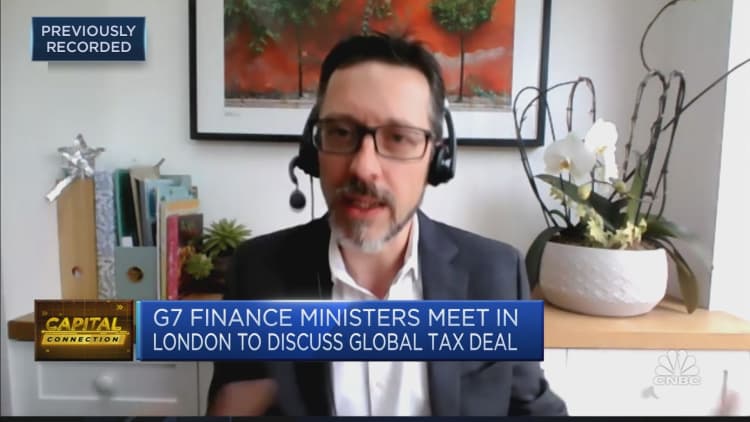
LONDON — The finance ministers of the most advanced economies, known as the Group of Seven, have backed a U.S. proposal that calls for corporations around the world to pay at least a 15% tax on earnings.
"G-7 finance ministers today, after years of discussions, have reached a historic agreement to reform the global tax system, to make it fit for the global digital age — and crucially to make sure that it's fair so that the right companies pay the right tax in the right places," U.K. Finance Minister Rishi Sunak announced in a video statement on Saturday.
If finalized, it would represent a significant development in global taxation. Leaders of the G-7, which include Canada, France, Germany, Italy, Japan, the U.K. and the U.S., will convene for a summit in Cornwall, U.K., next week.
An agreement among this group would provide needed momentum for upcoming talks planned with 135 countries in Paris. Finance ministers from the Group of 20 are also expected to meet in Venice in July.
"We commit to reaching an equitable solution on the allocation of taxing rights, with market countries awarded taxing rights on at least 20% of profit exceeding a 10% margin for the largest and most profitable multinational enterprises," according to a statement from the G-7 finance ministers.
"We will provide for appropriate coordination between the application of the new international tax rules and the removal of all Digital Services Taxes, and other relevant similar measures, on all companies," it said.
U.S. Treasury Secretary Janet Yellen, who is in London for the face-to-face meeting, hailed the move as significant and unprecedented.
"That global minimum tax would end the race-to-the-bottom in corporate taxation, and ensure fairness for the middle class and working people in the U.S. and around the world," she tweeted.
The historic agreement sheds light on the ambitions of President Joe Biden to step up taxes in the aftermath of the pandemic. His team had previously suggested a minimum global tax rate of 21% on the income earned by foreign affiliates of U.S. companies from intangible assets such as patents, trademarks, and copyrights, known as GILTI.
Saturday's announcement represents an attempt to prevent countries luring international businesses with low or zero taxes.
A global deal in this field would be good news for cash-strapped nations, who are trying to rebuild their economies after the coronavirus crisis.
But Biden's idea had not been received with the same level of excitement across the world. The U.K., for example, did not immediately voice its support for the proposal.
The issue can be contentious within the European Union as well, where various member states charge different corporate tax rates and can attract big-name firms by doing so. Ireland's tax rate, for example, is 12.5%, while France's can be as high as 31%.
Speaking in April, Irish Finance Minister Paschal Donohoe said smaller nations should be allowed to have lower tax rates given that they don't have the same capacity for scale as the larger economies do, the U.K.'s Guardian newspaper reported.
The world's most powerful economies have been at odds over taxation for some time, in particular in the wake of plans to tax digital giants more.
The U.S., under former President Donald Trump, vehemently opposed digital tax initiatives in different countries and threatened to impose trade tariffs against countries that would plan on taxing U.S. tech companies.
Some major firms across the world reacted positively the agreement on Saturday. Nick Clegg, vice president of global affairs at Facebook, wrote in a tweet that the company welcomed the G-7 tax rule.
"We want the international tax reform process to succeed and recognize this could mean Facebook paying more tax, and in different places," Clegg wrote.
Google spokesman Jose Castaneda told CNBC in a statement that the company supports efforts to update international tax rules. "We hope countries continue to work together to ensure a balanced and durable agreement will be finalized soon," he said.

Clarification: This article has been updated to include the U.S. proposal on a 21% tax rate on global intangible low-taxed income.

